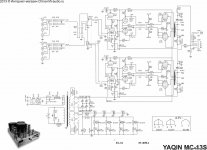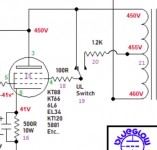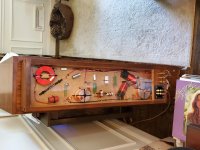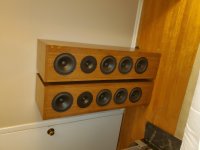I see that the output transformer has taps that goto pin 4 of the El84 B tubes, and from my very basic understanding is that this helps reduce distortion, but some say does not sound as open.
Again, I'm trying to learn as much as I can and not sound like a total noob... is disconnecting that wire from pin 4 of the El84b's all thats required to stop ultra linier mode?
From the schematic it looks like if I wanted to add a switch I would need a 4 pole single throw switch?
Again, I'm trying to learn as much as I can and not sound like a total noob... is disconnecting that wire from pin 4 of the El84b's all thats required to stop ultra linier mode?
From the schematic it looks like if I wanted to add a switch I would need a 4 pole single throw switch?
Attachments
You do lose a small amount of power in UL but --quote- "disconnecting that wire from pin 4 " ( screen grid ) ,you would then be running it in triode mode and you would lose a lot more power without a resistor from grid 4 to the HT+ .
It sounds like you visited websites like this one on the subject.
Triode vs Ultra Linear | AVForums
It sounds like you visited websites like this one on the subject.
Triode vs Ultra Linear | AVForums
The schematic lists EL34B tubes, Right?
You say EL84 B tubes.
Which is it?
If you take the screen connection from the output transformer UL tap, then you have to either:
1. Connect the screen to the plate (using a 100 Ohm resistor between the screen and the plate is suggested).
This is Triode mode, lower output power, but linear.
2. Connect the screen to the B+ (center tap of the output transformer). Depending on the output tube bias, you may need to use
a series resistor from the screen to the B+. Otherwise, you may melt the screen.
This is Pentode Mode.
This will be slightly higher output power than UL mode, but more open loop gain, so the negative feedback may have to be adjusted to keep the amplifier from being a Power Oscillator (poor amp, poor loudspeakers).
3. Be very sure that the un-modified amplifier works very well before you modify it.
Otherwise, if it no longer works, you will be like a dog chasing its tail.
4. Hardwire the Triode mode modification on one channel. Take measurements, and then listen.
Hardwire the Pentode mode modificatin on the other channel. Take measurements, and then listen.
Then decide what modification you want to use, if any, and try on both channels.
Only after that, do you want to put in a switch?
And by the way, be sure to turn the amp off, and wait until the B+ has discharged, before changing the switch position.
Otherwise, the output tubes, output transformers, your loudspeaker tweeters, and your ears will get a very loud transient.
It could be very revealing, if not destructive.
You say EL84 B tubes.
Which is it?
If you take the screen connection from the output transformer UL tap, then you have to either:
1. Connect the screen to the plate (using a 100 Ohm resistor between the screen and the plate is suggested).
This is Triode mode, lower output power, but linear.
2. Connect the screen to the B+ (center tap of the output transformer). Depending on the output tube bias, you may need to use
a series resistor from the screen to the B+. Otherwise, you may melt the screen.
This is Pentode Mode.
This will be slightly higher output power than UL mode, but more open loop gain, so the negative feedback may have to be adjusted to keep the amplifier from being a Power Oscillator (poor amp, poor loudspeakers).
3. Be very sure that the un-modified amplifier works very well before you modify it.
Otherwise, if it no longer works, you will be like a dog chasing its tail.
4. Hardwire the Triode mode modification on one channel. Take measurements, and then listen.
Hardwire the Pentode mode modificatin on the other channel. Take measurements, and then listen.
Then decide what modification you want to use, if any, and try on both channels.
Only after that, do you want to put in a switch?
And by the way, be sure to turn the amp off, and wait until the B+ has discharged, before changing the switch position.
Otherwise, the output tubes, output transformers, your loudspeaker tweeters, and your ears will get a very loud transient.
It could be very revealing, if not destructive.
Last edited:
For a guitar amp, sure. For a hifi amp, probably not so much.I see that the output transformer has taps that goto pin 4 of the El84 B tubes, and from my very basic understanding is that this helps reduce distortion, but some say does not sound as open.
Don't leave pin 4 floating, that will cause damage. 6A3 has you covered.is disconnecting that wire from pin 4 of the El84b's all thats required to stop ultra linier mode?
From the schematic it looks like if I wanted to add a switch I would need a 4 pole single throw switch?
This isn't a great place for a switch IMO. Pick one way and leave it there.
The schematic lists EL34B tubes, Right?
You say EL84 B tubes.
Which is it?
Doh! Is what I get for trying to get the question out on break at work..
As the blurry schematic stated, EL34B
Got it! So, off the anode, add a 100R than the screen..1. Connect the screen to the plate (using a 100 Ohm resistor between the screen and the plate is suggested).
This is Triode mode, lower output power, but linear.
TY
Amp works now, hardly EVER listen to it with the volume turned more than 1/4 - 1/3rd of the way up... The VU meter hardly ever dances...3. Be very sure that the un-modified amplifier works very well before you modify it.
Otherwise, if it no longer works, you will be like a dog chasing its tail.
Call me adventurous, Id like to have it all together and listen on/vs off...4. Hardwire the Triode mode modification on one channel. Take measurements, and then ...
but I do appreciate the warning and the advice, even if Im too stubborn to listen
Only after that, do you want to put in a switch?
And by the way, be sure to turn the amp off, and wait until the B+ has discharged, before changing the switch position.
Otherwise, the output tubes, output transformers, your loudspeaker tweeters, and your ears will get a very loud transient.
It could be very revealing, if not destructive.
I remembered a Bluglow video, and just took a screen shot that explained what you said... If I goto the plate with the 100R as shown, would adding a 1.2k to the output transformer tap (A) prevent the problem you describe ? (B) change the sound of the amp when the screen is connected to the center tap ?
EDIT- Just saw in the vid, that this schematic was from these very forums !
So, the question remains, If I go for the entire shebang, what type of toggle would I want to use ?
Attachments
Last edited:
Amp works now, hardly EVER listen to it with the volume turned more than 1/4 - 1/3rd of the way up... The VU meter hardly ever dances...
What speakers are you using?
I remembered a Bluglow video, and just took a screen shot that explained what you said... If I goto the plate with the 100R as shown, would adding a 1.2k to the output transformer tap (A) prevent the problem you describe ? (B) change the sound of the amp when the screen is connected to the center tap ?
No.
jeff
Any high-quality 10A 240V toggle will survive this duty for long enough for you to decide what mode you like best.
Yes it is some over nominal Voltage rating but vacuum-cleaners and other wall-power motors have HUGE turn-off spikes which switches must block. Also you are way-way under the current rating. Also you can get a spare just in case.
(Don't sell amps to strangers until you do a LOT of testing.)
Yes it is some over nominal Voltage rating but vacuum-cleaners and other wall-power motors have HUGE turn-off spikes which switches must block. Also you are way-way under the current rating. Also you can get a spare just in case.
(Don't sell amps to strangers until you do a LOT of testing.)
What speakers are you using
jeff
ELSINORE'S 😀
And, Im not interested in selling amps.. Will stick to what I do already...
(Sorry about the side ways attached.. responding from my android)
Attachments
Any high-quality 10A 240V toggle will survive this duty for long enough for you to decide what mode you like best.
Got it, but in AB I have 4 tubes to switch on and off.. is a relay a better solution?
Just an update, switch installed. May be PP doesnt benifet too much, as there is very little difference sound wise. On the O scope, you can see a 1khz signal clips at about 2 volts less in triode mode, than UL... While the operation was a sucess the benifet is barley perceptible. I guess in UL base sounds a little bit more pronounced, while in triode mode, its a bit softer, I would imagine different speakers might highlight the modes....
- Home
- Amplifiers
- Tubes / Valves
- mc-13s negative feedback



